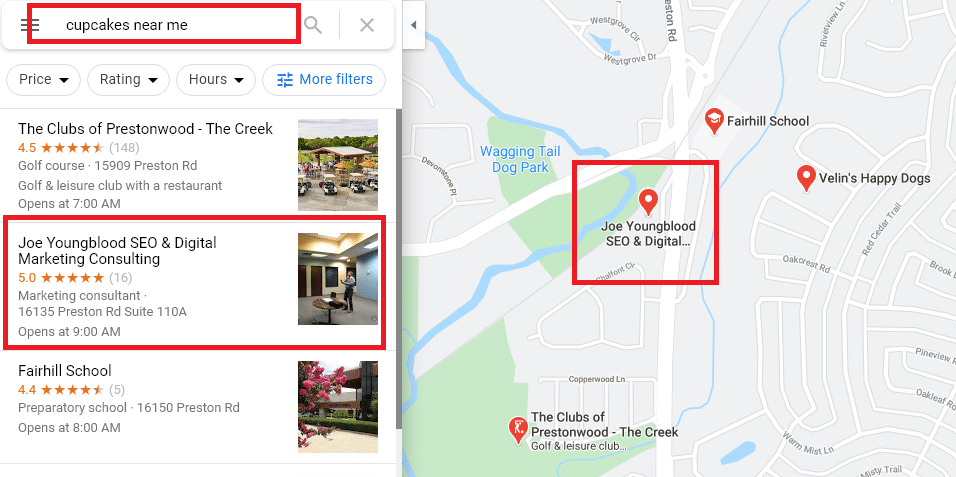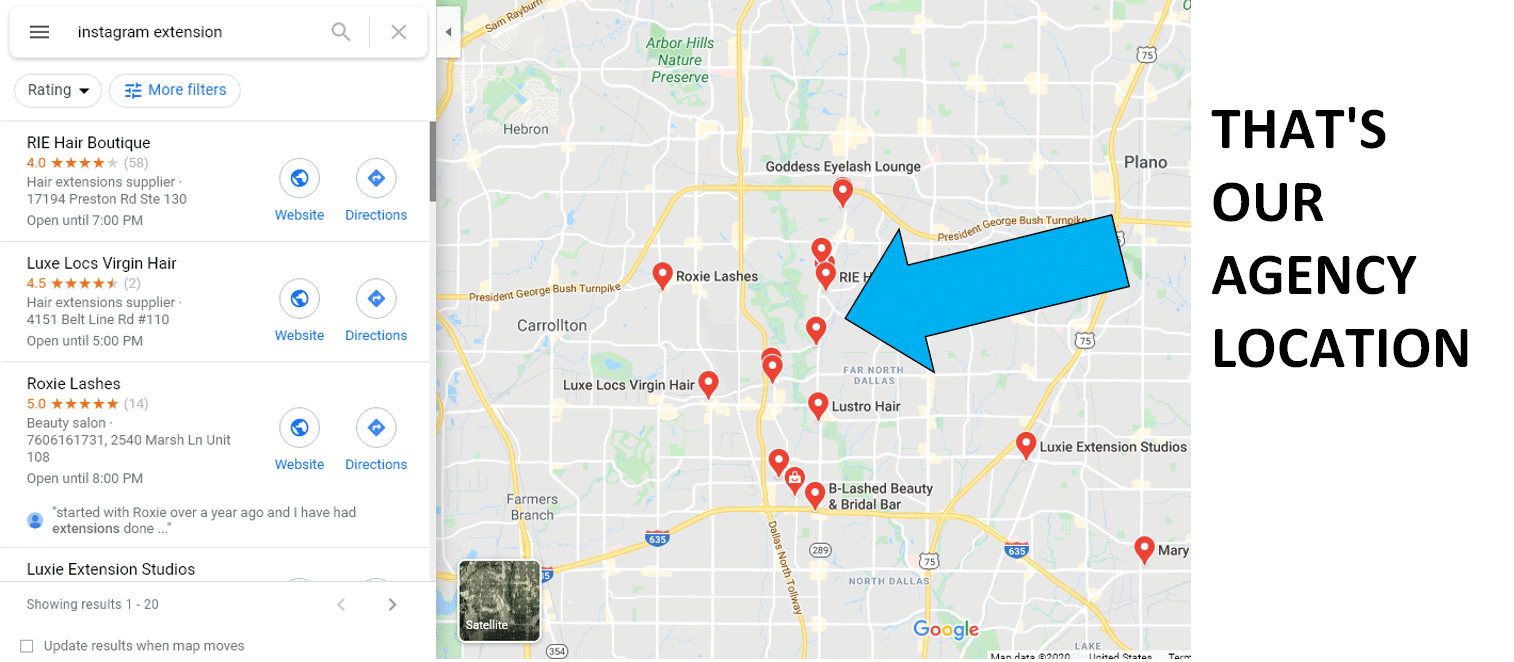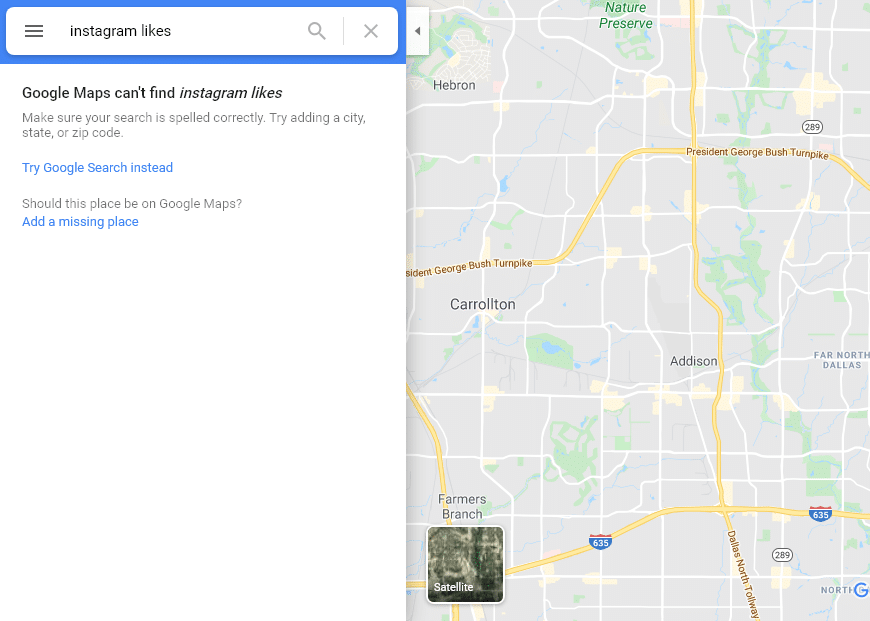In 2018 I published a research project detailing how Google Maps / Google My Business largely leaned on the name of a business to determine rankings, which has led to the outcome of spammy business titles. That same year Moz produced, for perhaps the last time, the Moz Local Search Rankings Factor Study. In that study, a survey of industry professionals, it was concluded that blogging had a mild impact on Local Organic results but did not have a direct impact on the Local Map / Pack results. While the name of a business still has tremendous weight, late last year Google announced a local algorithm update that Danny Sullivan (Google Search Liaison) referred to as “Neural Matching”, a sign that Google is looking for other local signals to help rank Google My Business profiles.
While digging through Google My Business Insights data for our agency a few days ago I stumbled across a keyword that we were ranking for that looked completely off. That keyword was “Cupcakes Near Me”.
While you might expect to see this keyword in the Insights of a cupcake business, a bakery, a restaurant that sells cupcakes, or even a grocery store; you probably wouldn’t think that a local seo agency or a facebook marketing agency would be appearing on Google Maps for this query.


Why the heck would Google Maps think we were relevant for this keyword? There’s only one explanation: They used a blog post.
In 2016 I wrote an article about Google Trends and Google Search Suggest during the 2016 election cycle after a “news” website declared they had evidence of Google manipulating Search Suggest to benefit one of the candidates (and one who had close ties with former Google CEO and President Eric Schmidt). That blog post included the word “Cupcakes” in the title and used a few cupcake searches as evidence to dispute this claim that Google was manipulating their engine to help a political candidate they may have wanted to become the next US President.
After making this discovery, I’ve spent the last few days researching on our clients GMB profiles, analytics, and Google Maps directly and I’ve been able to confirm that subject matters written about by clients on their blogs appear to be helping them rank for queries in Google Maps. In other words, we are seeing evidence that blog posts are directly impacting Google Maps search results.
One example I gave on Twitter is a contractor / construction client who we created a lengthy blog post for about fireplaces for a home. They now rank #1 for the keyword “fireplaces” in Google Maps within a 1.25 mile radius even though they do not sell fireplaces. For other various queries involving fireplaces they rank between #10 and #8 at the default city level, all based on one blog post.
We are seeing evidence that blog posts are directly impacting Google Maps search results.
Looking back at our listing we rank for the keyword “Instagram Extension” based on a different blog post but only if a user is within a few miles of our office. The rest of the businesses ranking for this keyword are hair and eye lash salons and boutiques.

However, our agency does not rank for the query “Instagram Likes” even though it is made from words in the title and associated with the blog post. In fact nothing ranks for this query on Google Maps as neither “Instagram” nor “Likes” have any local intent.

In total we’ve seen this on 13 different clients in Google My Business with the impact coming from both Blogs and Pages, however, so far Blog Posts from a WordPress website seem to have the most impact. There are various reasons this could be including that we produce really high-quality, well-written, blog posts for our clients and that this could be a signal that is ramping up.
The Data
- Number of Client Sites Examined: 13
- Number of Client GMB Profiles Examined: 13
- Percentage of Clients With a GMB Keyword derived from a blog post using “search this area”: 92.3%
- Percentage of Clients With a GMB Keyword derived from a blog post using default search: 61.5%
- Percentage of Clients With a Keyword in GMB Insights derived solely from a blog post: 76.92%
- Percentage of Clients With a Keyword in GMB Insights derived solely from a blog post: 30.76%
Some quick answers about what we’re seeing for you
1. This only appears to work if the blog post title / page title and content discuss something with local intent. For example our agency ranks for “Instagram Extension” likely because GMB thinks the word “Extension” is related to hair extensions.
2. The impact is minimal in many cases with a limited area of effect, especially if the keyword in question is not relevant to the business. While we were able to find our agency ranking for “cupcakes near me” and see that in the Insights data, it doesn’t appear in the default selection when searching on Google Maps mobile app while standing in the agency location. A good sign that while the blog posts are likely having the location considered, there is a relevancy filter kicking in (see Methodology and Caveats).
3. If the keyword is relevant the impact or area of effect can be as little as within a 0.75 miles of the business and on average extends roughly up to 1.25 miles in radius around the location. We have seen blog posts for clients showing an impact on rankings across an entire metropolitan area (nearly a 65 mi radius in that instance) but that was with only 2 local businesses offering a matching or relevant service.
4. A user who has clicked a profile for a business on a different keyword search, then clears their search and tries a local intent keyword associated with a blog post on that businesses website is more likely to see that business rank, though we don’t have clear numbers on this as it has proved difficult to test (more experimentation needed!).
5. No clue if this is being caused by Google’s Local Neural Matching algorithm or something else. However, my opinion is that this has something to do with the Neural Matching update.
6. Ranking for a keyword on Google Maps by default or using “search this area” does not mean that the business will appear in the local 3-pack on a standard Google search. Not all queries that Google Maps displays results for are determined to be a good fit for the 3-pack. For example you could search for “instagram tacos” on Google Maps and get a list of taco places nearby since “tacos” has local intent, however, a search on Google for this query does not give you a 3-pack.
How to Use This Information
For starters don’t build a blog and start writing keyword spam-filled content in hopes of ranking; it’s tacky, annoying, and it most likely won’t work. It appears that Google Maps relevancy filter may have a bug in it and/or may have to play catch up to rankings that are using blog post content as a signal.
Your blog posts should be useful and support your business and/or the service or product you provide. For example a bathroom remodeling contractor might produce a blog post about bathroom tech trends, a pediatrician might produce a blog post about the results from a new kid-focused medical study, a local grocer might create a blog post of the top foods for an upcoming holiday.
If you’re a local SEO consultant this research (or performing it on your own) should help convince your clients to start blogging more frequently and more properly since the keywords, concepts, and entities included in those posts may have a future impact on extremely valuable local rankings.
Methodology
We searched for keywords with local intent that could only be found in a blog post on a client’s website.
We used Google Maps searches on Desktop and via the Mobile app. Desktop searches were performed logged out using Chrome Incognito Mode and FireFox Private Browsing. To determine if blog posts were having an impact, keywords were tested in a tight radius using the “search this area” function of Google Maps slowly zooming out to determine area of effect. Then the keywords were tested using the normal search function of Google Maps.
Area of Effect here refers to the maximum estimated distance away from a business location a user might be and be able to surface the business in their search results.
We also used Google My Business Insights and examined the last month of keywords that a business profile appeared on and looked for instances where the keyword could only match a blog post on the site.
Caveats
1. “Search this Area” may not be representative of the default search for a keyword on either mobile or desktop and during the research it appears to bypass Google Maps relevancy filter (possibly a bug).
2. In the cupcake example on Google Maps mobile app we were unable to replicate the results of desktop via the default search and sorting by either relevancy or distance. Instead we had to zoom in on the map and use the “search this area” on mobile to find any business listing with a keyword that wasn’t considered ‘relevant’.
3. The irrelevant keywords may only appear for a short time. We’ve seen evidence that around mid-February is when most of these irrelevant blog-derived keywords appeared in Google My Business insights for our clients. This likely means that while the posts are being used to help support the algorithm’s decision to rank a business for X-keyword, the relevancy filter is the ultimate gate-keeper and will prune out business that don’t match a certain profile or category.
4. Some of the blog posts that matched keywords appear in Google My Business Insights and/or rankings we discovered have been submitted and linked to from “Posts” on Google My Business. However, this only accounts for about 12% of the blog posts we were able to confirm keyword rankings had been derived from.
5. This is an observation based study with a limited sample size (n = 13) which means the data can be skewed or not representative of what is actually happening.
Summary / tldr
We have found evidence that Google Maps is using content on the blog of a linked website to directly help rank business listings, likely in an effort to reduce the ability of spammers to rank highly. The evidence was discovered inside of Google My Business Insights and validated on over a dozen business listings. While our sample size was relatively small the evidence overwhelmingly points to this as being part of an algorithm shit in Google Maps.
Local business websites that are already creating high-quality, compelling, relevant, well-structured content on their blogs may notice increases in relevant rankings either in the recent past or the near-future. Those who are not doing so should take this as a sign to start.
Want to get updates about Local SEO & Marketing?